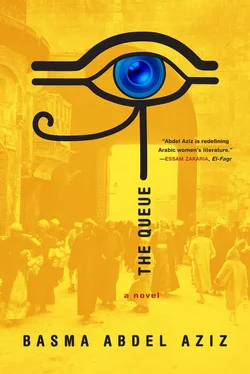“Amani? It’s Ehab, Yehya and Nagy’s friend. Are you okay?”
“I’m fine. Perfect timing, though. Are you in the hospital?”
“I’m out front. Do you need any help?”
“I think so.”
“Right, I’ll meet you at the entrance. I’m wearing a light-blue shirt and sunglasses, and I’ll be holding a newspaper.”
Amani quickened her pace back along the corridor to the lobby. She felt a sense of relief to no longer be dealing with this alone. She watched the entrance from afar, pretending to be talking on the phone so that none of the staff would ask her what she was doing or offer to show her how she may have strayed. Ehab appeared a few minutes later. He walked over to the Investigations and Instructions Desk and showed them his ID card, but after standing in front of the official for what seemed like an age, he became obviously exasperated with the conversation. Amani began to worry, and her heart beat faster when she saw Ehab tussle with the man and the other officials behind the counter.
She watched several guards rush over, shouting at Ehab, and they didn’t lead him away so much as carry him by his hands and feet to the hospital door before throwing him out. A tinny announcement echoed through the lobby, broadcast over the intercom on repeat, asking for her, Amani Sayed Ibrahim, to come to the Investigations and Instructions Desk immediately. She was now back at square one, or maybe even square zero. The Concealment Force was trained to catch people trying to infiltrate the place, and if she responded to the announcement, they would throw her out, too. Wildly, she wished the official would change his mind and let her have the X-ray, whether out of sympathy or complicity, but she knew that was impossible. She needed to act decisively, fearlessly. She didn’t have time to weigh her options, and there was no way of knowing what was best. She abandoned the idea that Ehab would return and pushed hope of the official’s sudden kindness far from her mind. If she wanted the X-ray, she would have to get it on her own.
She looked around. No one was following her, and she walked toward the elevator as the announcement was repeated for the tenth time. She pushed the button and slowly stepped out onto the fifth floor when the doors opened. Her eyes wandered across the large, barren space, which looked like it had been emptied of everything it had once contained. No people, no chairs, not even signs like those she’d followed on the ground floor, past hospital wards, offices, and officials. Nothing at all. She studied the high ceiling as the elevator doors rolled into motion and closed behind her. There was a doorway connected to the lobby, and she cautiously slipped through it and walked through the narrow corridors until she noticed a closed door. This, she suddenly realized, was what she had come for. Next to the door was a pink plaque made of some strange, shiny metal, and engraved on it were the words DEPARTMENT OF CRITICAL BULLET FILES. She grabbed the cold metal door handle, but there wasn’t enough time; the elevator opened again and angry voices clamored over one another. She couldn’t understand a thing they were saying, but she recognized a face in the confusion, the one face she’d hoped never to see at a moment like this.
Ehab tried to get back into Zephyr, but it was impossible. They had posted an enlarged photocopy of his ID card at the entrance and distributed it to the Concealment Force. He headed to the newspaper headquarters, where he met his editor and filled him in on what had happened, and then he set off for the queue in search of Nagy. He didn’t want to tell Yehya what had happened because he didn’t want to worry him, especially as Ehab didn’t have anything reassuring to say. After the scuffle in the lobby and being thrown out of the hospital, he had nothing good to report, and now Amani’s phone wasn’t in service, either. He and Nagy left the queue together, unseen by Yehya, and headed to Amani’s apartment. They knocked on her door for nearly a quarter of an hour, until the bawab came up to say he hadn’t seen her since that morning. She was probably still at work, the old doorman said, and he invited them to wait with him in front of the building until she returned.
They sat with the bawab for a long time as he made tea, took a few cigarettes out of his pocket and placed them in front of them, and then told them about the building he’d guarded since he was a boy. When he first arrived, the district had been a vast and remote expanse, there were no other buildings or people — just this one, its residents, and the desert beyond. The closest inhabited district was a few miles down the highway. But the place he had known had vanished long ago. High-rise buildings sprouted, scores of people marched in and settled down, markets opened up, and the area was now bursting at the seams. He let out a grievous sigh and gestured off into the distance with a veiny hand, saying that there was still one empty plot of land out there, vacant and vast. Ehab got excited, as he knew the land the doorman was referring to: it was now under the Gate’s dominion. The old man laughed and coughed, spouting a puff of smoke, and added that although many years had gone by, people were still reluctant to buy there because of its past. Everyone knew what had once stood there: a detention center from which those who’d entered never returned, not even after decades.
The old man said the area had changed a great deal since the Gate appeared, and even more so after it had closed and the queue formed nearby. Back when the Gate had still been open, there was always a huge commotion during working hours, with people shouting. But when its work ended, it became deathly still, and not a single voice was heard, as if no one had ever gone in and no one ever left. As time passed, he told them, people said the weather in the area was always strangely stifling — but only around the Gate — and that sometimes the sun both rose and set over the Northern Building, perhaps bowing to whatever went on in there. People passing by it became increasingly wary and didn’t even act like themselves when they were nearby, especially after the Disgraceful Events.
He leaned in a little closer, having decided he could trust them, and whispered that Amani had gone to Zephyr Hospital, that Zephyr Hospital belonged to the Gate, and that he had suspicions about her work, and about her involvement in those Events people talked about. On the night after the Events she hadn’t returned home until after midnight, which was unusual for her, and on more than one occasion people from strange organizations had come asking about her, although they’d never asked to speak to her directly.
They waited all day in front of her building, but Amani had vanished. Nagy and Ehab returned to the queue to look for Yehya, filled with a greater sense of helplessness than ever before. They both felt guilty that they hadn’t been with Amani from the start. When Um Mabrouk heard the news, she immediately decided to distribute leaflets; Abbas designed them in exchange for a few free phone calls, wafers, and juice, and signed it at the bottom as usual. He made copies at a nearby photocopier, whose owner owed him a favor, and gave her a hundred copies. The flyer featured an old photo of Amani, since Um Mabrouk didn’t have a recent one. Abbas had written her full name with great care, followed by the standard wording for these kinds of cases: an appeal to the Gate to intervene, find the person, and investigate the strange circumstances around the disappearance. Um Mabrouk put the flyers next to her wares, wailing and lamenting her eternal bad luck, and explaining — even in the absence of customers — that Amani was like a daughter to her. When she’d buried her elder daughter the day after she died, Amani had come from so far, cried like no one had ever cried before, and hadn’t even gone home until the funeral was finished and all the lights were out.
Читать дальше











